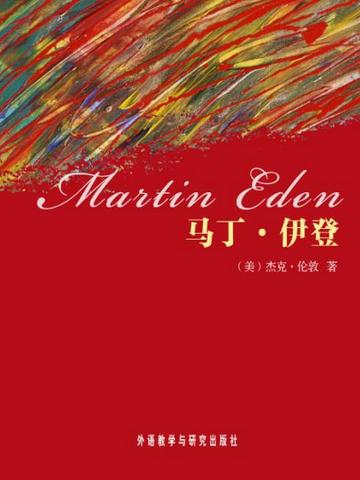他看透了世态炎凉、人情冷暖,空虚的心最终走向了自毁的道路。
Martin Eden, Jack London's semiautobiographical novel about a struggling young writer, is considered by many to be the author's most mature work. Personifying London's own dreams of education and literary fame as a young man in San Francisco, Martin Eden's impassioned but ultimately ineffective battle to overcome his bleak circumstances makes him one of the most memorable and poignant characters Jack London ever created. Martin Eden follows the rise and fall of a young sailor who by sheer force of will educates himself and succeeds in becoming a famous writer. It is also a valuable story about a young man maturing in his conception of love as regards the opposite sex.
青年水手马丁·伊登偶然结识了上流社会的罗丝小姐,受她的启发,发愤自学,并开始了艰苦的创作生涯。尽管处处碰壁,他仍不愿听从罗丝的安排,进她父亲的事务所,做个“有为青年”。后来他突然时来运转,以前被退回的稿件纷纷得到发表,成为当红作家。以前看不起他的亲友都争先恐后地来请他吃饭,连已和他决裂的罗丝也主动前来投怀送抱。这使他看清了这个世态炎凉的社会,对爱情所抱的美妙幻想也彻底破灭。他发现原来一切都是那么空虚,精神上的痛苦难以忍受,终于结束了自己的生命。作品虽然塑造了马丁这样一个强者,但又以他的自杀表现了对生命终极意义的否定。作品已被译成六十多种文字,在全世界广为流传。
Living in Oakland at the dawn of the 20th century, Martin Eden struggles to rise far above his destitute proletarian circumstances through an intense and passionate pursuit of self-education in order to achieve a coveted place among the literary elite. The main driving force behind Martin Eden's efforts is his love for Ruth Morse. Because Eden is a rough, uneducated sailor from a working-class background, and the Morses are a bourgeois family, a union between them would be impossible until he reaches their level of wealth and perceived cultural, intellectual refinement.
Just before the literary establishment discovers Eden’s talents as a writer and lavishes him with the fame and fortune that he had incessantly promised Ruth (for the last two years) would come, she loses her patience and rejects him in a wistful letter: "if only you had settled down...and attempted to make something of yourself." When the publishers and the bourgeois—the very ones who shunned him—are finally at his feet, Martin has already begrudged them and become jaded by unrequited toil and love. Instead of enjoying his success, Eden retreats into a quiet indifference, only interrupted to mentally rail against the genteelness of bourgeois society or to donate his new wealth to working class friends and family.
The novel ends with Martin Eden committing suicide by drowning, a detail which undoubtedly contributed to what researcher Clarice Stasz calls the 'biographical myth' that Jack London's own death was a suicide.
这是一部带有自传色彩的长篇小说,在这本小说中,杰克·伦敦倾注了他的全部心血,通过对马丁•伊登写作成长经历的描写,反映了自己如何在平庸的资产阶级的鄙夷下努力地读书和写作的经历,从中我们可以看出他个人的社会见解混杂着马克思主义的阶级观、斯宾塞的社会达尔文主义和尼采的“超人”说。
《马丁•伊登》是杰克·伦敦的代表作,带有自传性质,是世界文学史上最著名的自传体小说之一。
Martin Eden is assuredly one of Jack London’s greatest works. —Upton Sinclair
As Paul Berman points out in his Introduction, "In Martin Eden, London created one of the great twisted heroes of American literature . . . a hero doomed from the outset because his own passions are bigger and more complicated than any man could bear."
In a note to Upton Sinclair, Jack London wrote, "One of my motifs, in this book, was an attack on individualism (in the person of the hero). I must have bungled, for not a single reviewer has discovered it."
Joan London noted that "ignoring its tragic ending," the book is often regarded as "a 'success' story...which inspired not only a whole generation of young writers but other different fields who, without aid or encouragement, attained their objectives through great struggle."
- 第一章
- 第二章
- 第三章
- 第四章
- 第五章
- 第六章
- 第七章
- 第八章
- 第九章
- 第十章
- 第十一章
- 第十二章
- 第十三章
- 第十四章
- 第十五章
- 第十六章
- 第十七章
- 第十八章
- 第十九章
- 第二十章
- 第二十一章
- 第二十二章
- 第二十三章
- 第二十四章
- 第二十五章
- 第二十六章
- 第二十七章
- 第二十八章
- 第二十九章
- 第三十章
- 第三十一章
- 第三十二章
- 第三十三章
- 第三十四章
- 第三十五章
- 第三十六章
- 第三十七章
- 第三十八章
- 第三十九章
- 第四十章
- 第四十一章
- 第四十二章
- 第四十三章
- 第四十四章
- 第四十五章
- 第四十六章
- CHAPTER I
- CHAPTER II
- CHAPTER III
- CHAPTER IV
- CHAPTER V
- CHAPTER VI
- CHAPTER VII
- CHAPTER VIII
- CHAPTER IX
- CHAPTER X
- CHAPTER XI
- CHAPTER XII
- CHAPTER XIII
- CHAPTER XIV
- CHAPTER XV
- CHAPTER XVI
- CHAPTER XVII
- CHAPTER XVIII
- CHAPTER XIX
- CHAPTER XX
- CHAPTER XXI
- CHAPTER XXII
- CHAPTER XXIII
- CHAPTER XXIV
- CHAPTER XXV
- CHAPTER XXVI
- CHAPTER XXVII
- CHAPTER XXVIII
- CHAPTER XXIX
- CHAPTER XXX
- CHAPTER XXXI
- CHAPTER XXXII
- CHAPTER XXXIII
- CHAPTER XXXIV
- CHAPTER XXXV
- CHAPTER XXXVI
- CHAPTER XXXVII
- CHAPTER XXXVIII
- CHAPTER XXXIX
- CHAPTER XL
- CHAPTER XLI
- CHAPTER XLII
- CHAPTER XLIII
- CHAPTER XLIV
- CHAPTER XLV
- CHAPTER XLVI














 京公网安备 11010802032529号
京公网安备 11010802032529号
笔记加载中...